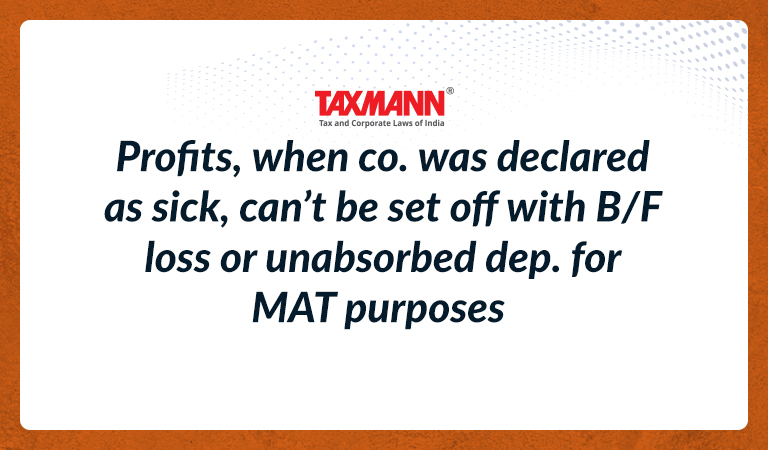Profits, when co. was declared as sick, can’t be set off with B/F loss or unabsorbed dep. for MAT purposes
- News|Blog|Income Tax|
- 2 Min Read
- By Taxmann
- |
- Last Updated on 19 October, 2022

Case Details: Kannappan Textile Mill (P.) Ltd. v. ACIT - [2022] 142 taxmann.com 510 (Chennai-Trib.)
Judiciary and Counsel Details
-
- Mahavir Singh, Vice President & Manoj Kumar Aggarwal, Accountant Member
- R. Vijayaraghavan, (Adv.)-Ld. AR for the Appellant.
- P. Sajit Kumar, (JCIT)-Ld. DR for the Respondent.
Facts of the Case
The assessee was a corporate notified as a sick company registered with BIFR under the Sick Industrial Companies Act. Being a sick company, the provisions under section 115JB did not apply to the assessee. However, during the relevant assessment year, positive book profits arose and the assessee attained the status of a non-sick company.
While computing the book profits as per 115JB, the assessee adjusted carried forward losses of earlier years without considering the book profit of years in which it was a sick company. During scrutiny proceedings, Assessing Officer (AO) denied the claim for brought forward losses contending that the losses should be first adjusted towards the book profits of years when assessee was sick Company.
On appeal, the CIT(A) confirmed the order of AO and the matter reached Chennai Tribunal.
ITAT Held
The Chennai Tribunal held that Book Profit is referred to the profits shown in the Profit & Loss Account that are specifically enhanced or reduced by specific items. One of the items that is to be reduced is the amount of loss brought forward or deprecation whichever is less as per Books of Account.
Further, as per clause (vii) of Explanation 1 to section 115JB(2), the profits of the sick company would be reduced for book profit computation.
It was noted that profits of a sick company had specifically been excluded from the purview of computation of book profit for MAT. The amount of brought forward business losses or depreciation would be allowable only when there were positive book profits.
Further, the positive book profits started arising to the assessee only from the year after the assessee became a non-sick company, and accordingly adjustment of brought forward business losses or depreciation would start from that year only.
Thus, since the assessee had correctly adjusted the brought forward losses and depreciation, AO was to be directed to grant adjustment as claimed by the assessee during the year.
List of Cases Referred to
-
- Asstt. CIT v. Biomed Hitech Industries Ltd. [IT Appeal No. 2001 (Mds.) of 2011, dated 20-11-2012] (para 5.1).
Disclaimer: The content/information published on the website is only for general information of the user and shall not be construed as legal advice. While the Taxmann has exercised reasonable efforts to ensure the veracity of information/content published, Taxmann shall be under no liability in any manner whatsoever for incorrect information, if any.

Taxmann Publications has a dedicated in-house Research & Editorial Team. This team consists of a team of Chartered Accountants, Company Secretaries, and Lawyers. This team works under the guidance and supervision of editor-in-chief Mr Rakesh Bhargava.
The Research and Editorial Team is responsible for developing reliable and accurate content for the readers. The team follows the six-sigma approach to achieve the benchmark of zero error in its publications and research platforms. The team ensures that the following publication guidelines are thoroughly followed while developing the content:
- The statutory material is obtained only from the authorized and reliable sources
- All the latest developments in the judicial and legislative fields are covered
- Prepare the analytical write-ups on current, controversial, and important issues to help the readers to understand the concept and its implications
- Every content published by Taxmann is complete, accurate and lucid
- All evidence-based statements are supported with proper reference to Section, Circular No., Notification No. or citations
- The golden rules of grammar, style and consistency are thoroughly followed
- Font and size that’s easy to read and remain consistent across all imprint and digital publications are applied



 CA | CS | CMA
CA | CS | CMA
